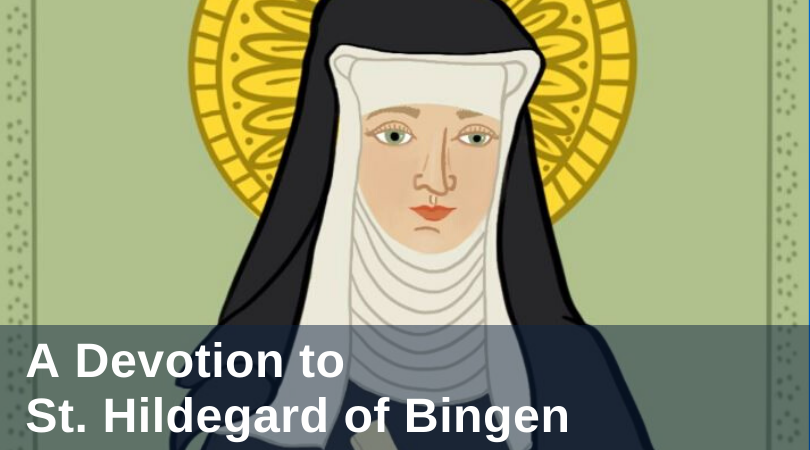
Editorial Note: This post is a part of our saint devotion series, in which one of our staff or faculty members explores their relationship with a particular saint. In honor of International Women's Day, we are highlighting female saints this week.
On my desk and bulletin board is a smattering of icons, statues, and a rotating collection of inspiring quotes and prayers. Amid this mish-mash are two images of a woman with whom I’ve had a strange relationship over the past 18 years: St. Hildegard of Bingen. One is a retablo by artist Lynn Garlick; the other, a woodcut by Julie Lonneman.
In the retablo, Hildegard holds a book and a feathered quill and looks up to heaven, where rays of light reach out in response to her gaze, penetrating her inquisitive mind. In the woodcut, Hildegard smiles serenely, eyes closed, as rays of light emanate from her head.
Both images speak to the active contemplation, or contemplative activity, which defined Hildegard’s life. No one who reads even a cursory biography could call her inactive: Hildegard composed music and dramas for her nuns to perform. She wrote poetry, as well as medical treatises offering remedies using plants and herbs. She traveled up and down the Rhine on a preaching tour during the latter years of her life—unheard of for a woman at that time (perhaps for our own time too). Men in power sought her counsel, including royals, clergy, even the Pope.
At the same time, no one who reads Hildegard’s writings or listens to her compositions could call her frenetic: her active life emerged from a deeply contemplative, deeply humble relationship with God. Hildegard experienced rich visions in which the cosmos showed forth God’s love and fidelity, a sign of the Creator’s relationship to his creatures. Unsure of their origin, Hildegard was reluctant to share her visions until she received a command from God: “Write down what you see and hear.” Now, her writings continue to radiate God’s love to those who encounter them, but only because Hildegard herself was radically receptive and obedient to that love.
Receptiveness and radiance. Action and contemplation. Love for nature, music, and writing, courage to speak truth to power and proclaim the Gospel. Like all saints, Hildegard of Bingen defies reduction, making her an uneasy figure for many. My first encounter with her was in an undergraduate music history class, where my professor dismissed Hildegard’s music because “she was crazy.” As a young, impressionable student, I took the professor’s word unquestioningly, writing Hildegard off in my own imagination not only as someone “crazy,” but perhaps even dangerous. Who was this presumptuous woman who bent the rules of composition, seemingly without any reference to what anyone else was doing at the time?
As Hildegard and I have crossed paths more over the years, I’ve realized that God was her only reference, that her unshakable faith empowered her to live fearlessly—to overcome opposition, to share the fruits of her contemplation and study, to express her deep faith in creativity guided by the promptings of the Holy Spirit.
In my work at the McGrath Institute—which includes everything from writing and speaking and composing to helping create courses and planning conferences—I’m often paralyzed by self-accusations of presumption: “Who do you think you are to compose music for the Church? To write blog posts and articles and books and give presentations to people far wiser than you?” Then I remember Hildegard, and I try to follow her example of holy creativity rooted in obedience to divine love. It’s only by trying to remain hidden in God, to remain little in the eyes of the world, that I can even remotely think about doing the work that I do. It’s only by rooting my work in my relationship with God that I ever find the courage to share a word or a note with anyone. My work will never radiate across the centuries as Hildegard’s has, but I hope that the few who encounter it will be drawn into a deeper understanding of divine love, as many who encounter Hildegard and her work have been (myself included).
St. Hildegard, patroness of composers and writers and so many others, pray for me. Pray for all of us. Help us to be radically receptive to God’s love and radiate it to the world through our work and our witness.
To download a free custom phone wallpaper featuring St. Hildegard, click the button below.



